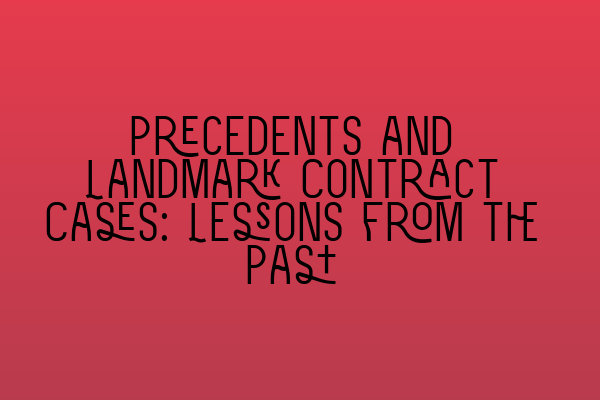Precedents and Landmark Contract Cases: Lessons from the Past
In contract law, precedents and landmark cases play a vital role in shaping the legal landscape. They provide guidance, establish principles, and offer valuable insights into various contractual issues. As aspiring solicitors, understanding these cases and their implications can greatly enhance our legal knowledge and ability to navigate complex contract disputes.
In this blog post, we will delve into some significant contract law cases that have left an indelible mark on the legal fraternity. By analyzing these cases, we can extract essential lessons that can assist us in providing effective legal counsel to our clients.
1. Carlill v. Carbolic Smoke Ball Co. (1893)
In this landmark case, the court held that an advertisement by the Carbolic Smoke Ball Company offering a reward to anyone who contracted influenza after using their product constituted a binding contract. This case highlighted the importance of clear and unambiguous language in contractual agreements.
Moreover, it established the principle that unilateral contracts, where one party accepts an offer by performing an act, can indeed be enforceable. The implications of this case are still relevant today when interpreting the intention of parties in contractual agreements.
2. Balfour v. Balfour (1919)
Balfour v. Balfour is a significant case that emphasizes the importance of intention to create legal relations in determining the existence of a valid contract. In this case, a husband promised to pay his wife an allowance while he worked abroad, but the court dismissed her claim as there was no intention to create legal relations.
This case highlights the need for parties to clearly demonstrate their intention to be legally bound in personal agreements. It serves as a reminder to solicitors to carefully assess the intentions of the parties involved before advising on the enforceability of a contract.
3. Donoghue v. Stevenson (1932)
The case of Donoghue v. Stevenson established the tort of negligence and transformed the field of contract law. This case involved the consumption of a contaminated drink, leading to illness and subsequent legal action against the manufacturer. The House of Lords held that the manufacturer owed a duty of care to the consumer, even in the absence of a contractual relationship.
Understanding the implications of this case is crucial for solicitors dealing with product liability claims. It highlights the duty of care that extends beyond contractual obligations and emphasizes the need for manufacturers to ensure their products are safe for consumers.
4. Williams v. Roffey Bros. & Nicholls (Contractors) Ltd (1990)
The case of Williams v. Roffey Bros. & Nicholls established the principle of practical benefit and highlighted the concept of consideration in contract law. In this case, the court held that a promise to pay additional money could be enforceable if it conferred a practical benefit on the promisor.
This case has significant implications, particularly in relation to variations in ongoing contracts. Solicitors can use this precedent to argue for enforceability when parties agree to modifications that offer practical benefits to both sides.
5. Paciocco v. Australia and New Zealand Banking Group Ltd (2016)
Paciocco v. ANZ is a recent case that explores the implications of penalties in contract law. The High Court of Australia clarified the test for determining whether a contractual provision constitutes a penalty. The case emphasized the need for penalties to be just and proportionate to the legitimate interests of the innocent party.
This precedent is relevant for solicitors involved in drafting and negotiating contracts. It reminds us to ensure that contractual provisions are not excessive or oppressive and to carefully consider the appropriateness of liquidated damages clauses.
Conclusion
Studying precedents and landmark contract cases allows us to glean valuable insights and lessons from the past. These cases provide a foundation for understanding key principles in contract law and help us offer sound legal advice to our clients.
By analyzing cases such as Carlill v. Carbolic Smoke Ball Co., Balfour v. Balfour, Donoghue v. Stevenson, Williams v. Roffey Bros. & Nicholls, and Paciocco v. ANZ, we can better navigate the intricacies of contractual disputes and ensure legal agreements are fair and enforceable.
For further practice in contract law and other areas, you can check out our SQE 1 Practice Exam Questions and SQE 1 Practice Mocks FLK1 FLK2 articles. Additionally, if you are preparing for the SQE exams, our SQE 2 Preparation Courses and SQE 1 Preparation Courses can provide you with valuable resources and guidance. Stay updated on important dates with our article on SRA SQE Exam Dates.
